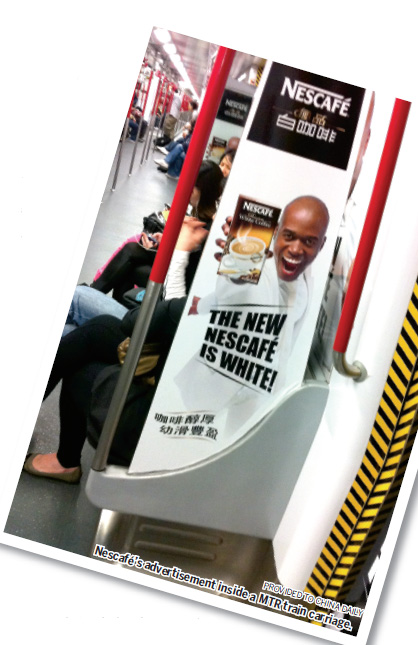Different strokes
Updated: 2011-03-29 06:57
By Andrea Yu(HK Edition)
|
|||||||


Hong Kong prides itself on its racial tolerance and acceptance of minorities. The standard of what is tolerable here, however, is often at variance with what is considered good taste in treating racial minorities in other parts of the world. And the local standard often raises eyebrows. Andrea Yu reports.
Akin Jeje couldn't help but roll his eyes when he first saw the ad campaign for Nescaf's newest line of instant coffee. An ecstatic black man is pictured, clad in a bright white suit proudly thrusting the feature product to the fore, accompanied by the slogan: "The New Nescaf is White!" The ad campaign, launched in December 2010, was featured at Mass Transit Railway (MTR) stations and in train carriage interiors across the city.
"Well, for one thing they're not being particularly politically correct," says Jeje, an African-Canadian who's been living in Hong Kong for over five years. Where Jeje was raised, racial sensitivity plays a much larger role in shaping the local culture.
"Stereotyped images aren't as big a problem in the Hong Kong market as they would be in the Canadian market," Jeje says. "To put it more bluntly, how many black people are in Hong Kong anyway?"
Hong Kong has clear laws against racism. The Race Discrimination Ordinance was enacted by the Equal Opportunities Commission in July 2008 to make direct and indirect discrimination unlawful.
Despite the ordinance, Hong Kong isn't immune to instances of racial insensitivity, such as that of the Nescaf ad campaign.
Ironically, when questioned about the advertisement, many members of the African community didn't find it upsetting. It was the Western born or educated residents who were more attuned to political correctness who expressed greater concern about racial insensitivity.
Isaac Kong is a 26-year-old theology student who was born and raised in Hong Kong. He acquired an appreciation for Western culture as a result of spending seven years acquiring his education in Britain. Along with that came an understanding of the British standard of what is acceptable and not acceptable when dealing with diverse racial groups.
Issac Kong recalls his first response to the advertisement. "My initial reaction was 'wow, that's racist'. It's offensive to me, but it's my Western-educated mind that tells me to think so," Issac Kong says.
"I thought it was naive and thoughtless," says British-born Tom Grundy, a 29-year-old English teacher who has been living in Hong Kong for a cumulative five years. "The agency was making a deliberate point about color by putting a black man in a white suit."
Contrast the reactions of Kong and Grundy to those of Kong's locally born-and-raised peers who have never resided in a Western country.
"Well, I laughed. It's a good (ad), but I think the hairless person in the photo looks scary," says Hugo Wong, 20.
"It's quite a good advert, but I don't like that someone is smiling at me every minute in the MTR," says Dave Cheung, 27.
Unlike Kong and Grundy, racial undertones weren't considered in the initial reactions of these Hong Kong Chinese locals. And while race was highlighted by Adams Bodomo and Neil Brown, two members of Hong Kong's black community, their nonchalant reactions fell more in line with the Hong Kong locals than those of the Western-minded Kong and Grundy.
"I didn't really get offended by it," says Bodomo, director of the University of Hong Kong's African Studies Programme. He says he thinks that Hong Kong locals aren't racist, but rather, ignorant.
"They just don't know much about Africa. Hong Kong people aren't particularly picking on Africans. The attitude is not negativity towards Africa," Bodomo says. "I would understand people who are worried about this advertisement, but in my opinion it's making mountains out of molehills."
Neil Brown, a British-Jamaican resident of Hong Kong, isn't bothered by the advertisement either." You know what's funny, If (it) were released in Jamaica, it would be one of the most popular adverts," Brown says, laughing.
He owes his lack of concern to more severe instances of racism in his past.
"It's nothing compared to what we had to put up with when we were young," Brown says. "I had people calling me 'black bastard'."
Jeje agrees. "I grew up in (the Province of) Alberta in the 1980's ... we tended to develop a thick skin."
But Brown does believe that some, like Kong and Grundy, would feel uncomfortable with the ad.
"I think anyone who is quite (politically correct) or pro-multiculturalism would feel it's a bit much. They would have a problem with it, whatever race they may be," Brown says.
The difficulty faced with the Race Discrimination Ordinance is that it doesn't address milder forms of racial insensitivity, like that of the Nescaf ad. When Mariana Law, senior officer of the Equal Opportunities Commission was questioned about the advertisement, Law said that it "does not seem to impact directly on the Race Discrimination Ordinance". That, in Hong Kong's eyes, means the ad isn't racist.
"(The Ordinance) is about treating people less favorably on the basis of their race. But on the face of it we can't see any less favorable treatment to a certain race," Law says.
"We have to see whether the activity will incite hatred or serious contempt of a person because of their race."
While Nescaf's White Coffee campaign wasn't extreme enough to be flagged under the ordinance, the original ad was still brought down in under a week - far earlier than the three-week advertising period held by 90 percent of MTR advertisement campaigns. It was subsequently replaced with a similar design - the slogan stayed but the black man did not.
"Someone caught it. I know there were some complaints from the consumer side," says Judy Kong, hesitantly. She's the director and vice-president of Dentsu Hong Kong - the advertising agency that represents Nescaf here.
When an inquiry into the campaign began, so did the finger pointing.
"It was developed in Beijing by G4, under the Publicis group," says Judy Kong, who's quick to clear her agency's name. "This is not our own work. I just want to make it clear-cut."
"The creative was given to us from the client," says Judy Kong. "We have to use it despite the fact that we have talked about the point of sensitivity. At the end of the day, it's really the client's decision."
JC Decaux is the agency responsible for screening and booking advertising campaigns that appear in MTR stations and trains. Peggy Jor, a representative from JC Decaux's marketing team explains that the final artwork for advertisements must be approved by both JC Decaux and the MTR Corporation. But again, campaign development and decisions are solely made by the client.
"We are just the media platform," says Jor. "I do want you to know that it is not our company which initiates changes. They're paid for by our client if they would like to change anything."
Requests for an interview with the advertising firm responsible for the campaign received no response.
"Please rest assured that we have no means to bring up the slightest sense of unease feeling among consumers," Laurent Beloeuvre, regional creative director of Publicis G4 - Beijing, said by email. "In fact, we have finished this introductory campaign which lasted only for a short while and moved onto the next phase in advertising."
Danny Mok, the Hong Kong CEO of the advertising and marketing agency Grey Group, says he doubts the ad was intentionally racist. "My first reaction is that they're playing on contrast," Mok says. "I don't think they are trying to commentate anything negative on the black guy. They're not making fun of him. They're not discriminating (against) him."
But had the ad come across the desk of Lilian Leong, managing director of advertising agency Leo Burnett Hong Kong, she wouldn't have approved it. When Leong was asked if she thought it was racist, here was her reply - "I think so, from my perspective ... it could have been more sensitive."
The Nescaf advertisement brings to mind another infamous instance of racial insensitivity. Many of the sources contacted mentioned the case of Darlie Toothpaste, which was originally named "Darkie" and featured a stereotypical black man as its logo.
The name change and a logo update made the black man less stereotypical. But this only came about after the brand, originally developed by the Asia-based company Hawley & Hazel, was acquired by Colgate-Palmolive in 1985. The product still attracts media attention for its racial stereotyping, as demonstrated by a Newsweek article from November 30, 2010.
Isaac Stone Fish, author of the article, faced a similar brick wall in his research into Darlie.
"Colgate declined Newsweek's interview requests ... Hawley & Hazel also declined an interview request," Fish wrote.
Jeje himself says he "isn't thrilled" when he sees a tube of Darlie toothpaste. "It's a thin cover up. They might as well call it by their original name," he says. "If they really were serious about not offending anybody, they would have changed it altogether."
"Same with the coffee ad, they're reacting to outside protest, not really an intrinsic fear of truly offending anyone. It's a sign of pragmatism," Jeje says.
In fact, Darlie's product name in Chinese is still called "Black Man Toothpaste".
"People are sensitive to their potential clients, their attitudes and needs and perspectives," says Jeje. "But if most of their clients wouldn't be offended by it, it gives them a lot more room to do what they want."
Hong Kong's demographic and cultural makeup has changed since the days of Darkie, making it more important to consider who might be offended by what. But increasing awareness of racial attitudes towards Hong Kong's community will be a challenge.
Jeje has his way to describe his sentiments.
"Let me put it this way - if there were similar ads placing Hong Kong Chinese in a stereotypical light, I'm wondering what the reaction would be," Jeje says.
"It's almost like the population needs to get a taste of their own medicine. If they're all right with being stereotyped, then fair is fair."
(HK Edition 03/29/2011 page4)